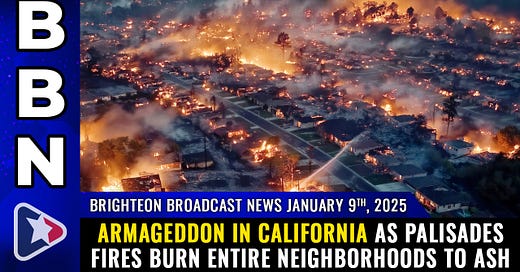As wildfires rage across California, leaving devastation in their wake, a stark contrast in emergency response systems between the Golden State and Texas has ignited a heated debate about governance, resource allocation, and the role of political priorities in public safety. While California struggles with what critics call a "cluster bleep of bad planning," Texas is being lauded for its efficient, hands-on approach to disaster management, exemplified by its handling of the Lost Pines Fire in 2011.
The Palisades Fire, currently ravaging parts of Los Angeles, has already burned over 15,000 acres, forced 50,000 residents to evacuate, and caused tens of billions of dollars in damage. Amid the chaos, reports of dry fire hydrants, overwhelmed emergency services, and widespread looting have painted a grim picture of California's preparedness—or lack thereof. Critics argue that the state's leadership, often focused on progressive social policies, has neglected the practical necessities of disaster readiness.
In contrast, Texas, with its "can-do" attitude and robust emergency response infrastructure, has been held up as a model of efficiency. Mike Adams, a Texas resident and commentator, recounted his experience during the Lost Pines Fire, where helicopters swiftly mobilized to scoop water from local ponds to combat the flames. "Texas does an amazing job in dealing with emergencies," Adams said. "It's one of the things I really appreciate about living here."
Adams' account highlights a key difference: Texas' culture of immediate action and resourcefulness. During the Lost Pines Fire, local authorities and residents worked in tandem, with power line workers braving harsh conditions to restore electricity and law enforcement stepping up to assist affected communities. This collaborative, no-nonsense approach stands in sharp contrast to the criticism leveled at California's leadership, which has been accused of prioritizing ideological agendas over practical solutions.
California's woes are compounded by a series of missteps. Reports indicate that Los Angeles County failed to refill reservoirs despite advanced warnings of high winds and fire risk. Additionally, the state's power grid has been unreliable, leaving hundreds of thousands without electricity during critical moments. Critics have also pointed to the appointment of an openly LGBTQ+ fire chief in Los Angeles, arguing that while diversity is important, it should not overshadow the need for experienced leadership in crisis situations.
The fallout from California's wildfires extends beyond the immediate destruction. Insurance companies, wary of the state's recurring disasters, have been pulling out in droves. State Farm, one of the largest insurers in the U.S., announced its exit from California last year, leaving many homeowners without coverage. This exodus has left the state's "Fair Plan," an insurer of last resort, exposed to nearly $458 billion in potential liabilities—a financial burden that could push California to the brink of bankruptcy.
Meanwhile, Texas has managed to maintain a more stable insurance market, thanks in part to its proactive disaster management strategies. The state's emphasis on preparedness and resilience has not only saved lives but also protected its economy from the kind of catastrophic losses California is now facing.
The contrast between the two states has sparked a broader conversation about the role of governance in disaster response. Critics argue that California's focus on progressive policies has come at the expense of practical governance, leaving residents vulnerable to natural disasters. "Being woke doesn't put out fires," Adams quipped, encapsulating the frustration many feel toward California's leadership.
As California grapples with the aftermath of the Palisades Fire, the lessons from Texas' approach to disaster management are impossible to ignore. While wildfires are a natural phenomenon, the human response to them is not. The crisis has underscored the importance of prioritizing public safety over political agendas, ensuring that resources are allocated effectively, and fostering a culture of preparedness.
For now, the people of California are left to pick up the pieces, while the rest of the nation watches and wonders: Will this disaster serve as a wake-up call for better governance, or will it be another chapter in a recurring story of mismanagement and missed opportunities? Only time will tell, but one thing is clear: the stakes have never been higher.
For more updates, visit NaturalNews.com












Share this post